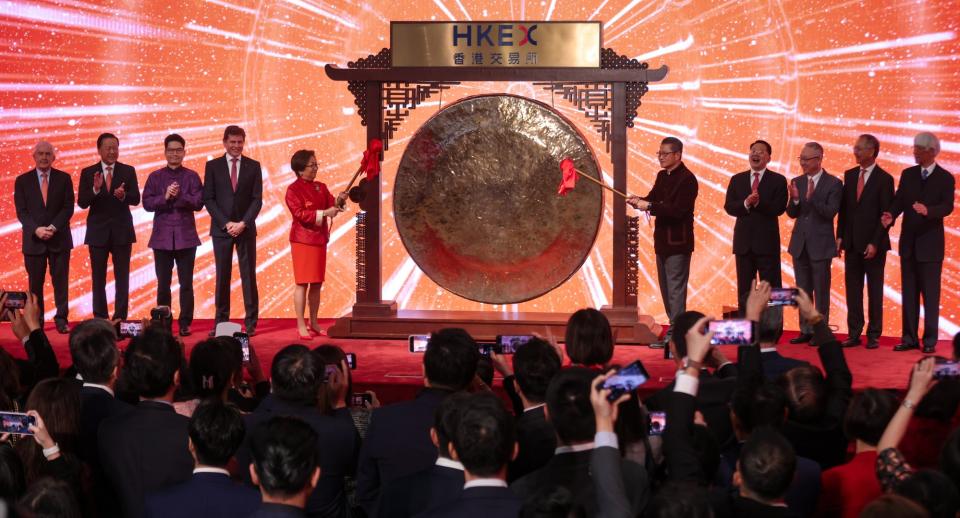Year of the Dragon bodes well for Hong Kong's ailing stocks as rate cuts, improving Chinese economy bring hope, officials say
Hong Kong's financial leaders greeted the Year of the Dragon with fanfare, optimistic that the auspicious zodiac sign will breathe some fire - or at least some life - into the city's beaten down stock market.
"Hong Kong stocks posted positive returns in the past four Years of the Dragon," said Financial Secretary Paul Chan Mo-po during a ceremony organised by bourse operator Hong Kong Exchanges and Clearing (HKEX) on Wednesday to mark the first trading day of Lunar New Year. The market may be boosted by potential interest rate cuts in Europe and the US, he added.
"In addition, the mainland [Chinese] economy is stable and improving," he said. "These factors will bring a positive atmosphere to investment sentiment and the asset market."
Do you have questions about the biggest topics and trends from around the world? Get the answers with SCMP Knowledge, our new platform of curated content with explainers, FAQs, analyses and infographics brought to you by our award-winning team.
The Hang Seng Index jumped 0.8 per cent on Wednesday, reversing an earlier 1.2 per cent fall. Since its inception in 1969, the city's benchmark gauge has experienced positive returns every time the Year of the Dragon has rolled around. The mythical creature represents a particularly propitious year in Chinese culture.
The last Year of the Dragon, in 2012, saw a 15 per cent gain, according to Bloomberg data, a year highlighted by policy easing by global central banks. Similar factors may spur the local market this year too, Chan added.
"Various factors have also made us cautiously optimistic about the Year of the Dragon," said Chan. "The most important thing is to work with everyone to think of more solutions, innovate and find good development opportunities in the future."
The market could certainly do with a dose of good fortune. The Year of the Rabbit, which ended on February 9, was a miserable one for local equities as the Hang Seng Index slumped by a record 29 per cent.
"The market will hopefully see a floor in negative sentiment, but the degree of optimism still hinges on how much the fragile confidence can improve," said Gary Ng, a senior economist at Natixis Hong Kong. The Federal Reserve rate decision in March, as well as the two sessions - China's annual meetings of the legislature and political advisory body - will be important events to note, he added.
Chinese authorities have had to intervene in the market, via verbal support and state fund buying, to shore up financial markets at home after a rout that erased more than US$1 trillion of value in Hong Kong, Shanghai and Shenzhen over the past three years. The Hang Seng Index fell about 14 per cent in 2023, capping an unprecedented four-year losing streak.
Market pundits, including the American economist Stephen Roach, had said Hong Kong's best days were now over. Index provider MSCI will remove scores of Chinese stocks from its Global Standard indices and three from the MSCI Hong Kong Index, after its February review.
"I understand that many people have seen the recent coverage regarding a few stakeholders who hold a pessimistic view towards the Hong Kong market or that Hong Kong's best days are behind it," outgoing HKEX chair Laura Cha Shih May-lung, said. "I completely disagree. We recover and bounce back every time."
"When others say that we are headed for the bottom, we always rebound and hit new highs," she said. "Every time [Hong Kong] has proved its own strength and resilience." The city's many advantages, including rule of law and market transparency, will support recovery and restore investor confidence, she added.

Finance officials line up by the gong at the Lunar New Year market opening celebration at the HKEX. Photo: Jonathan Wong alt=Finance officials line up by the gong at the Lunar New Year market opening celebration at the HKEX. Photo: Jonathan Wong>
"The previous year has not been an easy one for Hong Kong's financial community, but Hong Kong is defined by its resiliency and adaptability," said Nicolas Aguzin, the CEO of the exchange operator. The Argentine has agreed to step down on February 29, having brought forward his departure from May when his three-year term ends. Bonnie Chan will take the helm from March 1.
Despite the difficulties presented by the wider economic environment, Hong Kong's financial markets continued to demonstrate resilience, with derivatives, fixed income, and ETF trading volumes reaching record highs, said Aguzin. Many opportunities abound, he said.
"As China continues to grow, [and] as Asia represents more of the world, this part of the world will need places like Hong Kong to provide that access to opportunities," said Aguzin.
This article originally appeared in the South China Morning Post (SCMP), the most authoritative voice reporting on China and Asia for more than a century. For more SCMP stories, please explore the SCMP app or visit the SCMP's Facebook and Twitter pages. Copyright © 2024 South China Morning Post Publishers Ltd. All rights reserved.
Copyright (c) 2024. South China Morning Post Publishers Ltd. All rights reserved.
